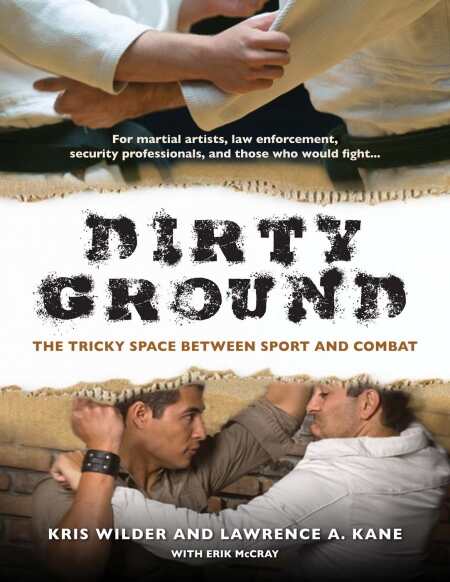Dirty Ground
The Tricky Space between Sport and Combat
With a focus on “drunkle,” incapacitating without hurting a “drunk uncle,” this book finds a niche beyond most martial arts manuals.
Kris Wilder has black belts in Goju-Ryu karate, taekwondo, and judo; and Lawrence A. Kane is a black belt in Goju-Ryu karate and a past security supervisor at a Pac-12 football stadium, allowing the authors to present a cross-disciplinary approach to basic and intermediate martial arts moves—and how to wield them. While this is one of the unique aspects of Dirty Ground: The Tricky Space Between Sport and Combat, the authors’ application of the techniques is the defining feature.
Wilder and Kane show how to employ the skills in three arenas: sport (classical martial arts training and competition), combat (real life self-defense scenarios), and the tricky space in between that the authors call “drunkle”—named for the combination of drunk and uncle—where martial artists are subduing a dangerous or out-of-control person without causing injury. Each venue has its own goals, its own definition of winning, and its own limits of force. The authors take the responsibilities inherent in each of these spaces very seriously and are intent on giving readers the physical and mental skills they need to act appropriately in each situation. Through meticulous explanations of history and technique, and the authors’ integrity and respect for people and fighting procedure, the book persuasively shows readers the intent behind the conflict is more important than the fighting moves themselves.
Focusing on “drunkle” showcases the daily-life applicability of martial arts skills that could otherwise seem formal or arcane. It broadens the book’s audience from people who are interested in, or practice, martial arts to those who want to effectively and confidently protect themselves, their friends, and their families—even when the danger is coming from within one of those zones. As its tagline states, the book is particularly vital for law enforcement and security professionals; it augments the verbal and physical negotiation training they receive, and provides new tools and perspectives to help them protect people effectively. The book would also be useful to social workers, school employees, drug addiction counselors, and any other professionals who may encounter violent teens and adults.
The writing is clear and simple as it explains how to consider each of the three types of conflict and employ the martial arts movements. Even in the most step-by-step portions of the book, the authors emphasize the thought and intent behind the move so readers can achieve their desired results.
The cover and back panel design are very professional—well balanced with text, images, and negative space. The interior photos are often small and dark; it requires a bit of eyestrain to see the martial arts moves in the level of detail needed for readers to duplicate the skills. The title and subtitle don’t make it clear that this is a book about marital arts. The tagline (“For martial artists, law enforcement, security professionals, and those who would fight…”) and cover images help give readers an understanding that this is a martial arts book.
Dirty Ground will prepare readers of all kinds to defend themselves in sport, combat, and “drunkle.”
Reviewed by
Melissa Wuske
Disclosure: This article is not an endorsement, but a review. The publisher of this book provided free copies of the book and paid a small fee to have their book reviewed by a professional reviewer. Foreword Reviews and Clarion Reviews make no guarantee that the publisher will receive a positive review. Foreword Magazine, Inc. is disclosing this in accordance with the Federal Trade Commission’s 16 CFR, Part 255.

